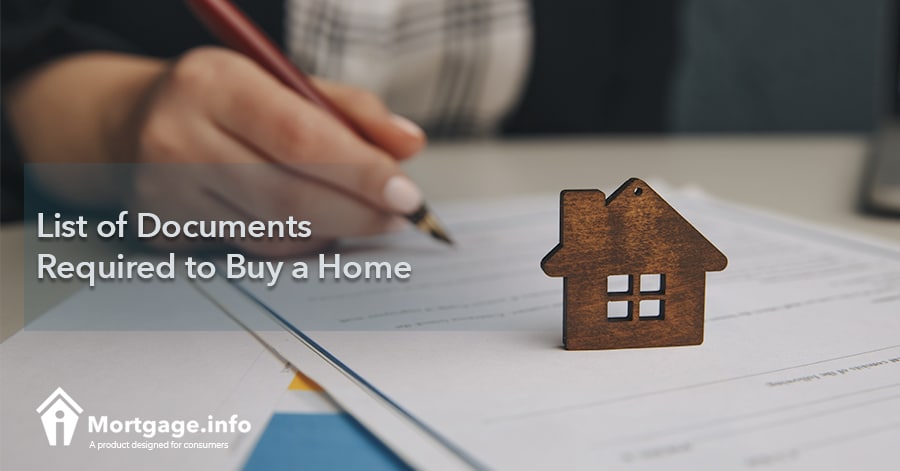
Are you ready to buy a home? Before you step foot into a potential home, you should take the time to get pre-approved. This way you know what size loan you can get. When you combine the loan amount with the amount of your down payment that you have saved, you’ll have a pretty good idea of how much money you can spend on a home.
Looking for Current Mortgage Interest Rates? Click Here.
Just what does a lender need to process your loan? There are many documents, but we help you understand each of them below.
Income Documents
Your lender is mostly interested in your income documentation. Sure, you probably told the loan officer how much money you make a year or even per month, but they need proof. The lender will need proof of your current receipt of income as well as proof of the money you received in the past.
You can do this by providing:
- Paystubs covering the last 30 days of employment
- W-2s for the last two years
- Tax returns for the last two years if you are self-employed or work on commission
- Profit & Loss Statement if you are self-employed
The lender will use this information to verify the income that you claimed that you make. They will also verify basic information verbally with your employer. This lets the lender know beyond a reasonable doubt that you do make the money you said you made.
Asset Documentation
If you are going to make a down payment or pay your own closing costs, you must prove that you have the funds. Lenders look for what they call ‘seasoned funds.’ These are funds that have sat in your account for at least two months. If you have any funds that you deposited within the last two months that don’t coincide with your income, expect the lender to inquire about them.
In order to verify your assets you’ll need to provide the last two months of statements from every account you plan to use to buy the home. For example, if you have a savings account, a money market account, and stocks you will sell, you need statements for each account.
If you have large deposits showing on the last two months of bank statements, you’ll need to provide proof of where they originated. For example, if you sold your car, you can provide the bill of sale. If you sold stocks, you can provide the proof of the sale. Lenders just need to know beyond a reasonable doubt that the funds aren’t any type of loan.
Housing History
If this is your first home purchase, you’ll need to let the lender know about your housing history. Did you rent an apartment, live with mom and dad, or live in a dorm in college? No matter where you lived, if you paid rent, you need to provide proof of the payments.
The lender needs to see how much you are used to paying for housing as well as if you paid it on time. You can provide the lender with a Verification of Rent form that your landlord completes or you can provide the last 12 months’ worth of canceled checks to show the amount and the date that you paid the rent.
Click to See the Latest Mortgage Rates.
If you had a mortgage, the lender should be able to find your housing history on your credit report. If they can’t, they may ask for a Verification of Mortgage from your lender.
Letter of Explanation
If you have any unique circumstances that the lender will come across, such as a gap in your employment or a period of late payments, you should explain them. While you can probably give a decent explanation over the phone, the lender needs it to be official or in writing.
The Letter of Explanation could be the difference between a loan approval and a loan denial, so make sure that you write it well and include as much information as possible. This is your chance to plead your case to your lender, so make it good.
Gift Letter
If any part of your down payment or closing cost money will come from someone other than you, a gift letter is necessary. The gift letter should state the donor’s name, the amount they are gifting, the date, and the property address they are providing the money for you to buy. They should also include your relationship and a statement that shows the money is not a loan.
The lender will also need to source the funds from the donor, which means they’ll need the donor’s last two months of bank statements. They will also need to track the funds going from the donor to your bank account. You should provide a copy of the check, a copy of the deposit ticket, and a copy of your bank statement showing the deposit.
Some lenders may ask for more documentation than we stated above, but these are the basics that lenders require. The key to a successful and quick closing is to get the documentation to the lender as quickly as possible. If you provide the lender with a full package, which includes all of the documents from above, they can get through the underwriting quicker and let you know right away if they need anything else.
